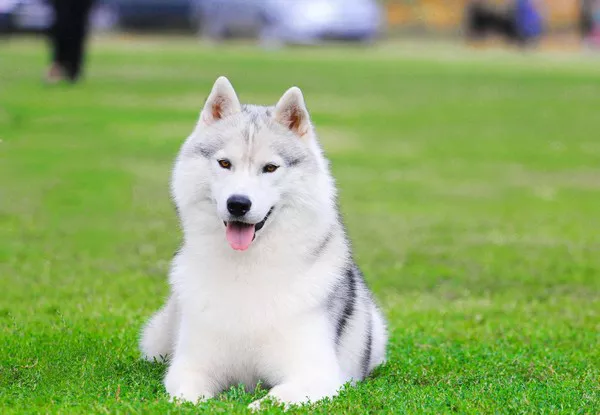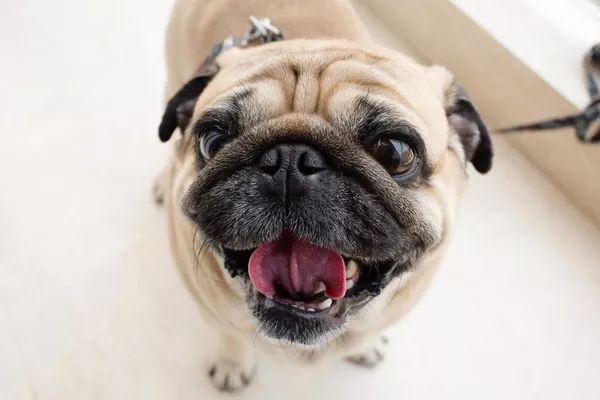Shar Pei puppies are undeniably adorable with their characteristic wrinkled skin and distinctive blue-black tongue. As a senior Shar Pei breeding expert, I am often asked about the energy levels and behaviors of these puppies. One common question that arises is, “Are Shar Pei puppies hyper?” This article aims to explore this question in depth, drawing on years of experience and knowledge about Shar Pei dogs, their habits, health conditions, and eating habits.
Understanding Shar Pei Puppy Behavior
What are the typical energy levels of Shar Pei puppies?
Shar Pei puppies, like many other breeds, experience various levels of energy as they grow. Typically, Shar Pei puppies are not considered hyperactive compared to other breeds. While they do have playful and energetic moments, they tend to exhibit a more balanced energy level. This moderate energy makes them suitable for families who prefer a dog that is not overly demanding in terms of exercise and attention.
Shar Pei puppies enjoy playing, exploring, and interacting with their environment, but they are also known for their independent nature. They often have bursts of activity followed by periods of rest and relaxation. This balanced approach to activity is part of what makes Shar Pei puppies unique and appealing to many dog lovers.
How does their temperament influence their activity levels?
The temperament of Shar Pei puppies plays a significant role in their overall activity levels. Shar Peis are known for their calm and dignified demeanor. They are often described as being loyal, affectionate, and somewhat reserved. This temperament tends to result in a puppy that is less likely to be hyperactive.
However, it is important to note that individual personalities can vary. Some Shar Pei puppies may be more energetic and playful than others, depending on their genetic makeup and upbringing. Early socialization and training are crucial in shaping a Shar Pei puppy‘s behavior and ensuring they grow into well-balanced adult dogs.
Health Conditions Affecting Activity Levels
Can health issues make a Shar Pei puppy more or less active?
Health conditions can significantly impact the activity levels of Shar Pei puppies. Some health issues may cause a puppy to be less active, while others might lead to increased energy or restlessness.
Common Health Concerns in Shar Pei Puppies
Shar Pei puppies are prone to certain health conditions that can affect their activity levels. Some of these include:
Hip Dysplasia: This genetic condition can cause pain and discomfort in the joints, leading to reduced activity levels. Puppies with hip dysplasia may be less inclined to engage in vigorous play or exercise.
Entropion: A condition where the eyelids roll inward, causing irritation and discomfort. Puppies with entropion may be less active due to the discomfort caused by this condition.
Skin Infections: The unique wrinkles of the Shar Pei can sometimes harbor bacteria, leading to skin infections. A puppy suffering from a skin infection may become lethargic and less active.
Managing Health for Optimal Activity
Ensuring that Shar Pei puppies receive proper veterinary care is crucial for maintaining their health and activity levels. Regular check-ups, a balanced diet, and appropriate exercise can help prevent or manage many of the health issues common in this breed. By keeping Shar Pei puppies healthy, owners can ensure they remain active and playful without becoming hyperactive.
Diet and Exercise
How does diet influence the energy levels of Shar Pei puppies?
Diet plays a vital role in the overall health and energy levels of Shar Pei puppies. Providing a balanced and nutritious diet is essential for supporting their growth and maintaining their energy levels.
Nutritional Needs of Shar Pei Puppies
Shar Pei puppies require a diet rich in high-quality proteins, healthy fats, and essential vitamins and minerals. Proteins are particularly important for muscle development and overall growth, while fats provide a concentrated source of energy. Additionally, vitamins and minerals support various bodily functions, including immune health and bone development.
Avoiding Common Dietary Pitfalls
Owners should avoid feeding Shar Pei puppies low-quality commercial dog foods that contain fillers, artificial additives, and low-grade ingredients. These types of foods can lead to nutritional deficiencies and impact a puppy’s energy levels. Instead, opting for premium dog foods or homemade diets that meet the specific nutritional needs of Shar Pei puppies is recommended.
What is the ideal exercise routine for Shar Pei puppies?
Exercise is another critical factor in managing the energy levels of Shar Pei puppies. While they are not as hyperactive as some other breeds, they still require regular physical activity to stay healthy and happy.
Daily Exercise Requirements
Shar Pei puppies benefit from moderate daily exercise. This can include:
Walks: Short to moderate-length walks provide physical exercise and mental stimulation. Puppies can explore their surroundings and develop socialization skills during walks.
Playtime: Engaging in interactive play with toys or other dogs can help burn off excess energy and strengthen the bond between the puppy and their owner.
Training Sessions: Incorporating training into exercise routines not only helps with obedience but also provides mental stimulation, which is crucial for Shar Pei puppies.
Adjusting Exercise as They Grow
As Shar Pei puppies grow, their exercise needs may change. It is important to adjust their routines accordingly to prevent overexertion, especially in young puppies. Gradually increasing the intensity and duration of exercise as the puppy matures helps ensure they develop strong muscles and joints without causing injury.
Socialization and Training
How does early socialization impact the behavior of Shar Pei puppies?
Early socialization is crucial in shaping the behavior and temperament of Shar Pei puppies. Proper socialization helps prevent behavioral issues and ensures that puppies grow into well-adjusted adult dogs.
Benefits of Early Socialization
Early socialization exposes Shar Pei puppies to various people, animals, environments, and experiences. This exposure helps them develop confidence and reduces the likelihood of fear-based behaviors. Well-socialized puppies are less likely to be anxious or overly reactive, which can sometimes be mistaken for hyperactivity.
Effective Socialization Techniques
Owners can use several techniques to socialize Shar Pei puppies effectively:
Positive Reinforcement: Rewarding puppies with treats and praise when they exhibit calm and appropriate behavior helps reinforce positive social interactions.
Controlled Exposure: Gradually introducing puppies to new experiences in a controlled manner ensures they do not become overwhelmed or stressed.
Puppy Classes: Enrolling puppies in puppy training classes provides structured socialization opportunities and helps them learn basic obedience commands.
See Also: Why Are Shar Peis So Aggressive?
What role does training play in managing Shar Pei puppy behavior?
Training is essential for managing the behavior and energy levels of Shar Pei puppies. A well-trained puppy is more likely to be calm and well-behaved, reducing the likelihood of hyperactive behavior.
Basic Obedience Training
Teaching Shar Pei puppies basic obedience commands, such as sit, stay, and come, helps establish a foundation of good behavior. Consistent training using positive reinforcement techniques fosters a strong bond between the puppy and their owner and promotes a calm and controlled demeanor.
Addressing Behavioral Issues
If a Shar Pei puppy exhibits hyperactive behavior, it is important to address the underlying cause. Behavioral issues such as boredom, anxiety, or lack of mental stimulation can lead to increased energy levels. Providing appropriate outlets for physical and mental exercise can help manage these issues effectively.
Lifestyle and Environment
How does the living environment affect Shar Pei puppy activity levels?
The living environment plays a significant role in shaping the activity levels of Shar Pei puppies. A well-structured and stimulating environment can help maintain a balanced energy level in these puppies.
Creating a Stimulating Environment
Providing Shar Pei puppies with a variety of toys, puzzles, and activities can keep them mentally and physically engaged. Interactive toys, such as treat-dispensing puzzles, can provide mental stimulation and prevent boredom, reducing the likelihood of hyperactive behavior.
Importance of a Routine
Establishing a consistent daily routine for Shar Pei puppies helps them understand expectations and reduces anxiety. A predictable schedule for feeding, exercise, playtime, and rest helps puppies feel secure and balanced, contributing to stable energy levels.
What impact does family interaction have on a Shar Pei puppy’s behavior?
The interaction between Shar Pei puppies and their families is crucial in shaping their behavior and energy levels. Positive family interactions contribute to a well-adjusted and content puppy.
Quality Time with Family
Spending quality time with Shar Pei puppies helps strengthen the bond between the puppy and family members. Engaging in activities such as playing, training, and cuddling provides emotional enrichment and reduces stress, promoting a calm and happy demeanor.
Setting Boundaries
Establishing clear boundaries and rules helps Shar Pei puppies understand acceptable behavior. Consistent and fair discipline, combined with positive reinforcement, ensures that puppies learn appropriate behavior and develop good habits.
Conclusion
In conclusion, Shar Pei puppies are generally not considered hyperactive compared to other breeds. Their balanced energy levels, combined with their calm and dignified temperament, make them suitable companions for families seeking a dog that is both playful and composed. Proper health care, nutrition, exercise, socialization, training, and a stimulating environment all play crucial roles in maintaining the optimal energy levels and behavior of Shar Pei puppies. By understanding and addressing the unique needs of Shar Pei puppies, owners can ensure they grow into well-adjusted, healthy, and happy adult dogs.
Related Topics:


























